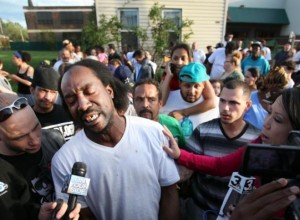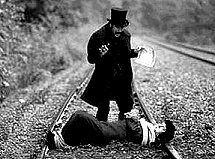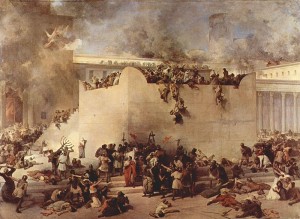
How to be a true hero
You’ve seen it hundreds of times. Some guy is being interviewed by the local news after he helped prevent some crime or rescued someone in distress. The reporter asks, “Do you consider yourself a hero?” Apparently, this question must be asked in order to test whether or not said person is in fact a hero. According to local news rules of heroism, the man is only a hero, if and only if, he claims to not be one. Most people, knowing this rule, go on to say that they don’t consider themselves to be a hero because they just did what anyone in their situation would’ve done. The reporter then cuts back to the anchorpeople who disagree with the man’s assessment. Feeling that the hero test was passed, they comment about what a true hero the man is while a colorful “local hero” graphic displays besides them. Personally though, I agree with the guy. He’s not a hero.
The modern-day notion of the hero harks back to the silent film era. A beautiful woman, tied to the railroad tracks, screams for help as a train approaches in the distance. Off to the side, a dastardly villain twirls his mustache with glee. But then, an attractive man approaches, and frees the woman from the tracks moments before the train would’ve crushed her. (Apparently, train engineers are not allowed to stop for damsels in distress.) The damsel plants a kiss on her savior’s cheek and exclaims, “My hero!” Except, he’s not a hero. A guy will do just about anything to get a guarantee lay from a hot babe. Now if it were an obese woman with a hairy lip, bad teeth, and a unibrow that the man saved, then, I might consider him a hero. But you never see that.
The fact is, humans are selfish creatures. No matter how it appears on the outside, we are almost always motivated by personal gain. Politicians, policemen, firemen, doctors, nurses, teachers, scientists, activists, volunteers, philanthropists—all admirable professions—yet, most do not enter these professions in order to better mankind. They do it for power, money, or prestige. They do it to feel important, to change something they personally don’t like, or to be admired or even loved. Even if they are doing it to make a difference and help people, as I attempt to do with this blog, it still isn’t the stuff of true heroism. So, how does one become a true hero according to my strict interpretation? An answer can be found in the book millions consider to be the be-all and end-all on truth—the Bible.
“Forgive them Father for they know not what they do.” Why is such a seemingly conceited statement attributed to Jesus as he’s on the cross? Can you imagine someone on death row, about to be executed, saying something so cocky? Not only does it assume that you have a personal connection to God that others do not have, and that you know better than everyone else, but that you believe that your request can persuade God about a decision He might not have made otherwise. No wonder this dude got crucified. If he was so enlightened, he could’ve just made this request on a telepathic level, or kept the thought to himself until meeting with God in the afterlife. Of course, had he done either, we wouldn’t have heard it. I believe that the message wasn’t truly about God forgiving us at all, or about the grave mistake that humans were making by killing their savior, but to teach us what it takes to be like this enlightened being. It teaches us about the ultimate sacrifice, and I’m not just taking about the death of the body, but the ego.
The ultimate sacrifice is not only to be a martyr for a cause, but to do so while going against the beliefs, standards, and mores of one’s peers. It is to risk being unpopular, foolish, or even hated in order to do something that would benefit these very people. Doing this task must be outside your comfort zone. It must involve leaving behind that which you are familiar—to let go of the ego’s need for approval, its need for respect, admiration, glory, honor, even love. In short, we must be someone who becomes the enemy of that which we hope to save, and we must suffer for doing so. Do this, and you are a true hero in my book. Do anything less, and you are just a good Samaritan. And according to history, the Samaritans were sinful, idol-worshipping, iniquitous people, so being a good one, much like being a good person in general, didn’t take much: to see someone who was robbed, beaten, and left to die on the street and, dare I say it—actually help them for example.
The parable of the good Samaritan, told by Jesus, teaches us how we should behave towards others—even those that are not our friends or neighbors. But his request to God after being crucified is how he demonstrates how to be like him—a true hero. He was okay with being hated and crucified for a cause, so much in fact that he didn’t want those doing it to be punished. He was able to see the big picture that they were not able to see, and so had to become the enemy for a greater good. What most people don’t seem to really think about is that had Jesus never been crucified, there’d be no Christianity today, and so Jesus’s words and stories would’ve likely been lost to antiquity.
With apologies to those who take the Bible literally, I see it as a book of myths—which may or may not have been based on various real events—that contains wisdom about how the world works. To me, worshipping Jesus is no different than worshipping King Arthur, Robin Hood, or Luke Skywalker—and I don’t mean that as a belittlement of those fictitious characters. Quite the contrary, they all carry truths hidden within their cloaks, crowns, and quivers. In fact, all mythic stories contain archetypes and wisdom that provide answers to the mysteries of life. Take Batman for example.
In The Dark Knight, when district attorney Harvey Dent turns villainous, Batman makes the heroic decision to take the fall for his crimes, hoping to empower Gotham in the name of Harvey’s legendary crime-fighting character. In fact, Batman had saved commissioner Gordon’s family from Harvey “Two-Face,” but felt that revealing what Harvey had become would leave his city disillusioned. So, he decided instead to become the bad guy. This decision reveals that Batman is not driven to fight crime for any kind of adoration. In his specific case, he does it out of his own personal compulsion based on his childhood trauma, but the message for us looks beyond that.
When we go outside our comfort zone to do something for others without credit or even recognition, that’s truly heroic. True heroes don’t need to be seen as heroes. And the only true test is whether they would continue trying to initiate positive change even at their own expense. At some point in our lives, all of us have probably done something to fit this definition, only it’s usually something we prefer not to think about because we believe that we may have done something wrong. Because those we admire or consider as equals may not approve of our actions, we may feel uneasy or even ashamed about what we’ve done, while in truth, it should be celebrated.
Back in July 2012, I wrote a post titled, “Why Forgiving Others Makes Life Better For You.” The article didn’t evoke a huge reaction from readers on my site, probably because most of my readers are spiritual types and the post was in line with most spiritual philosophy. However, the reaction was much different on one of the sites where the article was syndicated—The Good Men Project. Here, the reaction (fueled mostly by one person), skewed vehemently negative. I’ve dealt with vulgar online critiques before, but that was mostly about opinionated subjects revolving around politics or television. In this case, it was taken personally by someone who had been physically and sexually abused, and so the stakes felt much higher.
The back and forth comments went on for many days. So it wasn’t surprising that, towards the end of the drama, it had snuck into my subconscious in the form of a dream. In the dream, I was trying to help a troubled soul by using the books and information I’d gathered over the years, when a man intruded on our private conversation. I felt as though the man was going to discount or argue with what I was telling this person, and it really annoyed me. I was about to ask the man if he could give us some privacy when I woke up. It’s funny because at the time I thought that the angry comments were written by a woman, but a few days later came to learn that it was from a man—just as in the dream.
While not stated directly in the dream, it provided a revelation for me that gave me a whole new outlook on what I do and why I do it. The revelation was that I didn’t have to be given credit or even recognized for the benefits that my actions or writings may bring about. That this need for recognition comes from the ego. Even though the abused man never agreed with my writings, he went on to agree with what others had to say about forgiveness, which, in my opinion, was a perspective that was much more open and forgiving then from where he’d started.
For whatever reason, this man needed me to be the enemy. In fact, in his comments, he often made me out to be the one who had abused him. His specific words revealed volumes—that I was “forcing” my view on others, that I wasn’t open to others’ opinions, and that I kept doing it again and again. To me, it was clear that this man was projecting his pain onto me (in fact, he himself was guilty of everything he was accusing me of doing), but as the villain, there was absolutely nothing I could do to open this guy up to another opinion, which was a shame because it seemed as though his insistence on being the victim had poisoned his life and would ruin his future.
The revelation allowed me to see the bigger picture. That even though this man discounted everything I wrote, the intended result still occurred! His comments went from being long, rambling tirades about his pain and why forgiveness was not the answer, to shorter and shorter comments that were open to slightly different perspectives. Eventually, he agreed with another poster that forgiveness was a process and that I simply hadn’t communicated that effectively. One brick had been removed from this man’s fortress of hurt and victimization. But with that one brick removed, it enabled rational contact with the outside world, for light to shine in, and perhaps most importantly, that it was not impenetrable.
Sometimes, you do good work without getting the recognition. You may even be seen as foolish, or the enemy. But being appreciated isn’t necessary to bring about positive change. As with Batman, Spider-Man also faces severe criticism—in his case from years of negative press from his hometown’s Daily Bugle. The message is that a true hero or enlightened being shouldn’t need the credit because that need keeps you within your physical self, as opposed to growing beyond it. You don’t even need to be directly responsible for the positive change. As long as you initiated or helped initiate it, that’s enough to set a process in motion that will help bring about the desired result. The message is much bigger than the messenger.
Enlightened beings not only don’t need credit, much like Batman, they may sometimes even have to sacrifice their good name in order to do something for the greater good. This is how I interpret Jesus’s dying words. His message for all of us is that you don’t do good to be a hero, to be liked, appreciated, or to even succeed. You do it because you believe in your soul that it is the right thing to do. And no matter what anyone else says—even your closest loved ones—and whatever the repercussions, you do it because its benefits far outweigh your personal needs.
Even in the Old Testament, God tells Abraham, “Go from your country, your people, and your father’s household to the land I will show you.” (Genesis 12:1) The message is that the first step on our journey to spiritual growth is to leave behind the implied cultural demands of our homeland, the acceptance of our peers, and the expectations of our parents. This is one of the first commands of God in the Bible, and yet, few of us ever even take this first step.
The more we stick to the formula of letting go of our needs, going outside our comfort zone, and sacrificing our material gains for the greater good, the more we will grow. Of course, now that you know that, the question arises whether or not it still counts. Can we ever do anything unselfishly? The answer is no, because you need to be somewhat selfish to keep your physical body alive, but yes, the spiritual growth still counts. If only because even knowing about it, it’s still so incredibly difficult to do.
The night I had the revelation dream fell on the Hebrew date known as Tisha B’Av (the 9th day of the month of Av). This is a solemn day on the Jewish calendar that commemorates the destruction of both the First and Second Temples and a whole host of other negative events that befell the Jews on this date, albeit in different years. An email I’d recently received from the Meaningful Life Center’s Rabbi Simon Jacobson (whose weekly emails I often read) had explained that my experience with the angry poster was exactly in line with what we are meant to experience during this day. According to Jacobson, we create “fortifications” to protect us from others, and often times our defensive nature influences our personalities:
How much of our lives are driven by superficial surface factors — what we look like to others, how we dress, what opinions others will have of us? How much do you care about others reactions to you? We wear so many masks in life that often we can lose sight of our true identities. … Sometimes the only way see your true self is to strip yourself of all pretense and pretext; of all assumed identities. Tisha B’Av is just such a day, when we stand “naked” in face of the cracks that expose our vulnerability. But fear not: the purpose of the cracks is to reveal our true light. Please join Rabbi Jacobson in this pre-Tisha B’Av workshop as he deconstructs our spiritual and psychological temples, in order to discover the real you — the inside you — the person behind the mask and masquerade. Discover how to become the initiator instead of the reactor; how to strip away your charades and live your life from THE INSIDE OUT instead of the other way around. When your core is revealed you will be pleasantly surprised what you find.
While I never had a chance to listen to the presentation (found in the archives here by scrolling down to 7/25/12), I assume that Jacobson’s connection between the vulnerabilities and the date is relating the destruction of the Temples to the destruction of our outer façade, revealing the pure light within (just a guess, though an educated one since I’ve been following Jacobson’s wisdom for many years). What’s amazing to me is how his email, the date, and the experience all aligned so perfectly, resulting in the revelation I had.
According to Jewish belief, certain dates have an energy that allow us to get in touch with specific aspects of our personality—revealing the pure soul beneath—and the various rituals and traditions help with this process. (In fact, according to Jewish belief, this revealing of the soul is said to be the entire purpose of life on earth and the point of the religion is to give us the tools to do so.) So not only did this exchange help me to see an aspect of myself in another light, it also helped this man, who’d been carrying around this burden, to unload just a bit of it and take a step toward the path of healing. Even though he probably wouldn’t agree.
The exchange and resulting wisdom helped me to clear away my need to be seen as a hero or even a helper. It enabled me to let go of that requirement and allow myself to be a vehicle for greater good, no matter the repercussions for myself on a superficial level. I am deeply grateful for this revelation and pass it on in the hopes that you might find some meaning in it yourself. But even if you do—even if this post winds up helping you immensely—feel free to refrain from telling me about it.
May Your Inner Spark Grow To Light Your Way,
The Layman
Latest posts by Marc Oromaner (Posts)
- The long lost instruction book to the game of life - June 24, 2014
- Warning: Spirituality can be hazardous to your health & wealth - April 17, 2014
- Was 2012 an epic fail? - December 30, 2013
- 5 steps to uncover your destiny - September 20, 2013
- Evolution has been in The Bible all along - August 18, 2013
 Print This Post
Print This Post









Discussion Area - Leave a Comment